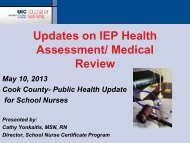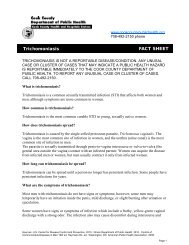Toolkit Overview - Cook County Department of Public Health
Toolkit Overview - Cook County Department of Public Health
Toolkit Overview - Cook County Department of Public Health
Create successful ePaper yourself
Turn your PDF publications into a flip-book with our unique Google optimized e-Paper software.
Your Role as a <strong>Health</strong>care Provider/Hospital Administration<br />
Intimate partner violence is a health issue. “In addition to the immediate trauma caused by abuse,<br />
domestic violence contributes to a number <strong>of</strong> chronic health problems, including depression,<br />
alcohol and substance abuse, sexually transmitted diseases such as HIV/AIDS, and <strong>of</strong>ten limits<br />
the ability <strong>of</strong> women to manage other chronic illnesses such as diabetes and hypertension.<br />
Despite these facts, a critical gap remains in the delivery <strong>of</strong> health care to battered women, with<br />
many providers discharging a woman with only the presenting injuries being treated, leaving the<br />
underlying cause <strong>of</strong> those injuries not addressed”, according to “The Facts on <strong>Health</strong> Care and<br />
Domestic Violence” by Futures Without Viloence (FWV).<br />
<strong>Health</strong>care Providers<br />
<strong>Health</strong>care providers are in a unique position to intervene with patients dealing with IPV and<br />
prevent future abuse through education and service referrals. Victims <strong>of</strong> IPV are more likely to<br />
seek assistance for abuse from their healthcare providers than mental health providers or IPV<br />
agencies. In fact, healthcare providers are <strong>of</strong>tentimes the only people IPV victims trust enough to<br />
disclose abuse in their lives.<br />
In order to improve the health outcomes <strong>of</strong> patients impacted by IPV, healthcare providers<br />
should:<br />
• Participate in IPV training to gain a greater understanding <strong>of</strong> the effects <strong>of</strong> IPV on patients<br />
overall health and improve skills to conduct effective IPV assessments and provide<br />
service referrals;<br />
• Routinely screen/assess for IPV with all female adolescent and adult patients and boys and<br />
men exhibiting signs <strong>of</strong> abuse;<br />
• Educate patients about the impact <strong>of</strong> physical, psychological and sexual abuse related to<br />
overall health;<br />
• Provide patients impacted by IPV with referrals for services such as local IPV agencies,<br />
legal assistance for protective orders, the hospital’s social service department, and at<br />
minimum an IPV hotline number.<br />
• Follow-up with patients who are IPV victims to ensure that desired services have been<br />
obtained and that the history <strong>of</strong> abuse is documented.<br />
Hospital Administration<br />
Hospital administrators play an essential role as institutional leaders to make systems changes<br />
that promote routine IPV assessments and effective partnerships with local IPV nonpr<strong>of</strong>it<br />
agencies and law enforcement authorities, including:<br />
• Instituting routine IPV assessments with patients as a hospital-wide expectation for teenage<br />
and adult women, as well as teenage and adult men presenting symptoms <strong>of</strong> abuse;
















